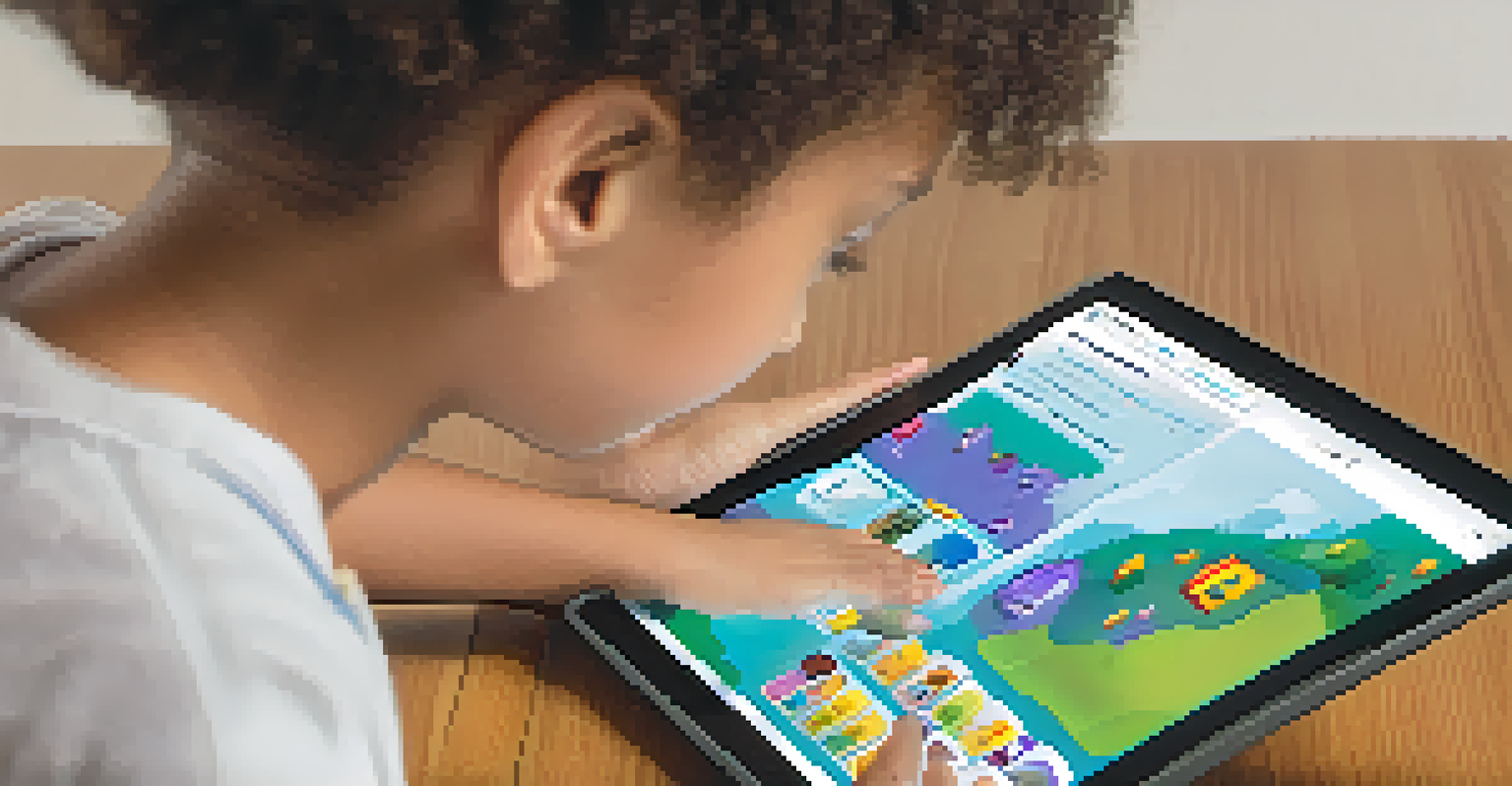Adaptive Learning Technologies: Personalizing Education

Understanding Adaptive Learning Technologies in Education
Adaptive learning technologies refer to tools and systems that adjust educational content based on individual student needs. These technologies analyze a learner's strengths, weaknesses, and preferences, creating a unique educational experience tailored just for them. Imagine having a personal tutor who knows exactly what you need to work on—that's what adaptive learning aims to achieve.
The future of learning is not about the technology itself, but about how we can use technology to enhance human learning.
These systems utilize algorithms and data analytics to provide real-time feedback, ensuring that students engage with material suited to their learning pace. For instance, if a student struggles with a mathematical concept, the system can offer additional practice problems and resources focused on that area. This personalized approach not only enhances understanding but also boosts confidence.
As education evolves, the integration of adaptive learning technologies is becoming increasingly vital. By meeting students where they are, these tools promote a more inclusive environment where everyone has the opportunity to succeed, regardless of their starting point.
Key Benefits of Adaptive Learning Technologies
One of the most significant benefits of adaptive learning technologies is their ability to foster personalized learning experiences. This means that students can progress at their own pace, allowing those who grasp concepts quickly to move ahead while others can take the necessary time to understand difficult material. This flexibility can lead to higher retention rates and improved academic performance.

Moreover, adaptive learning tools provide educators with valuable insights into student performance. Teachers can track progress and identify areas where students struggle, allowing them to tailor their instruction accordingly. This data-driven approach helps educators focus their efforts on what truly matters, ensuring that no student falls behind.
Personalized Learning Experiences
Adaptive learning technologies create tailored educational experiences that cater to individual student needs and learning paces.
Another key advantage is the increased engagement students experience when using adaptive technologies. By presenting content in varied formats and adjusting to individual learning styles, these tools keep learners motivated and interested. Engaged students are more likely to take an active role in their education, leading to a more fulfilling learning journey.
Examples of Adaptive Learning Technologies
There are many adaptive learning platforms available today, each with unique features. For example, platforms like DreamBox Learning and Smart Sparrow offer interactive lessons that adjust in real-time based on student performance. This means that if a student answers a question incorrectly, the system can provide hints or additional practice to ensure understanding.
Adaptive learning technology personalizes the educational experience, allowing each student to learn at their own pace and style.
Another notable example is Knewton, which utilizes big data analytics to create customized learning paths for students. By analyzing the vast amount of data generated by learners, Knewton can predict which content will be most effective for each individual, thus optimizing their learning experience. This tailored approach can significantly enhance a student's educational journey.
Additionally, tools like Lingvist and Duolingo adapt language learning to the user's proficiency level, offering personalized vocabulary and grammar exercises. These platforms not only make learning more effective but also more enjoyable, as students interact with content that resonates with their current skills and goals.
Challenges in Implementing Adaptive Learning Technologies
While adaptive learning technologies offer numerous benefits, there are challenges in their implementation. One significant hurdle is the initial cost of adopting these systems, which can be a barrier for many educational institutions. Budget constraints often lead schools to prioritize essential resources, leaving technology upgrades on the back burner.
Another challenge is the need for teacher training. Educators must familiarize themselves with these technologies to effectively incorporate them into their teaching strategies. Without proper training, teachers may feel overwhelmed, potentially diminishing the system's effectiveness and benefiting the students.
Data-Driven Insights for Educators
These technologies provide valuable data analytics, helping teachers identify student challenges and adapt their instruction accordingly.
Lastly, data privacy concerns are paramount in the education sector. As adaptive learning technologies collect and analyze student data, it's crucial to ensure that this information is handled securely and ethically. Balancing the benefits of personalized learning with the need for student privacy is a challenge that educators and tech developers must address together.
The Role of Data in Adaptive Learning
Data is at the heart of adaptive learning technologies. These systems rely on a constant flow of information about student interactions, performance, and preferences to make informed adjustments. By collecting and analyzing this data, adaptive learning platforms can identify trends and tailor educational experiences that resonate with each learner.
For instance, if a student consistently struggles with a specific type of math problem, the system can flag this as an area for additional support. By applying data insights, educators can intervene earlier, providing targeted assistance that addresses the root of the issue. This proactive approach can prevent students from falling behind.
Furthermore, data-driven insights can help shape curriculum development and instructional methods. By understanding which topics students find challenging or engaging, educational institutions can refine their teaching strategies and materials to better meet the needs of their learners. This continuous feedback loop fosters a more effective and responsive learning environment.
Future Trends in Adaptive Learning Technologies
As technology continues to advance, the future of adaptive learning looks promising. One emerging trend is the integration of artificial intelligence (AI) to enhance personalization further. AI can analyze data more efficiently, allowing adaptive learning systems to refine their recommendations and interventions in real-time.
Additionally, the rise of mobile learning presents new opportunities for adaptive technologies. With more students accessing educational content through smartphones and tablets, there is a growing demand for responsive, mobile-friendly platforms. This shift enables learners to engage with personalized content anytime, anywhere, making education more accessible.
Future of Education with AI
The integration of artificial intelligence is set to enhance the personalization of adaptive learning systems, making education more accessible and effective.
Finally, we can expect to see greater collaboration between educators, technologists, and researchers in developing adaptive learning solutions. By sharing insights and best practices, these stakeholders can create more effective tools that cater to diverse learning styles and needs, ultimately leading to a more equitable education system.
Conclusion: Embracing Adaptive Learning for Better Education
In conclusion, adaptive learning technologies represent a significant step forward in personalizing education. By tailoring learning experiences to individual needs, these tools have the potential to transform the educational landscape, making it more inclusive and effective. As we continue to embrace these technologies, the focus must remain on enhancing student engagement and success.
While challenges exist, the benefits of adaptive learning far outweigh the drawbacks. As schools and educators invest in these technologies, they can provide students with the support they need to flourish academically. This commitment to personalized education not only benefits individual learners but also contributes to a more skilled and knowledgeable society.

Ultimately, embracing adaptive learning technologies is about recognizing that every student has a unique learning journey. By prioritizing personalized education, we can ensure that all learners have the opportunity to reach their full potential, paving the way for a brighter future.